Research Proposal: ICT's Positive Impact on Refugees in Africa
VerifiedAdded on 2021/01/02
|15
|4278
|473
Project
AI Summary
This research proposal investigates the impact of new technologies, specifically Information and Communication Technology (ICT), on refugees in Africa. The study aims to identify ICT trends, determine the advantages of ICT for refugees, assess its influence, and recommend implementation strategies for development. The methodology involves a qualitative approach using an inductive research approach and interpretivism as the research philosophy. Data collection will involve secondary sources like scholarly articles and primary data through questionnaires administered to a sample of 25 African refugees using non-probability sampling. The proposal includes a detailed timescale, a literature review covering ICT trends in Africa and its advantages for refugees, along with ethical considerations. The research seeks to contribute to understanding how ICT can positively impact the lives of refugees by improving communication, access to information, and facilitating economic and social integration.
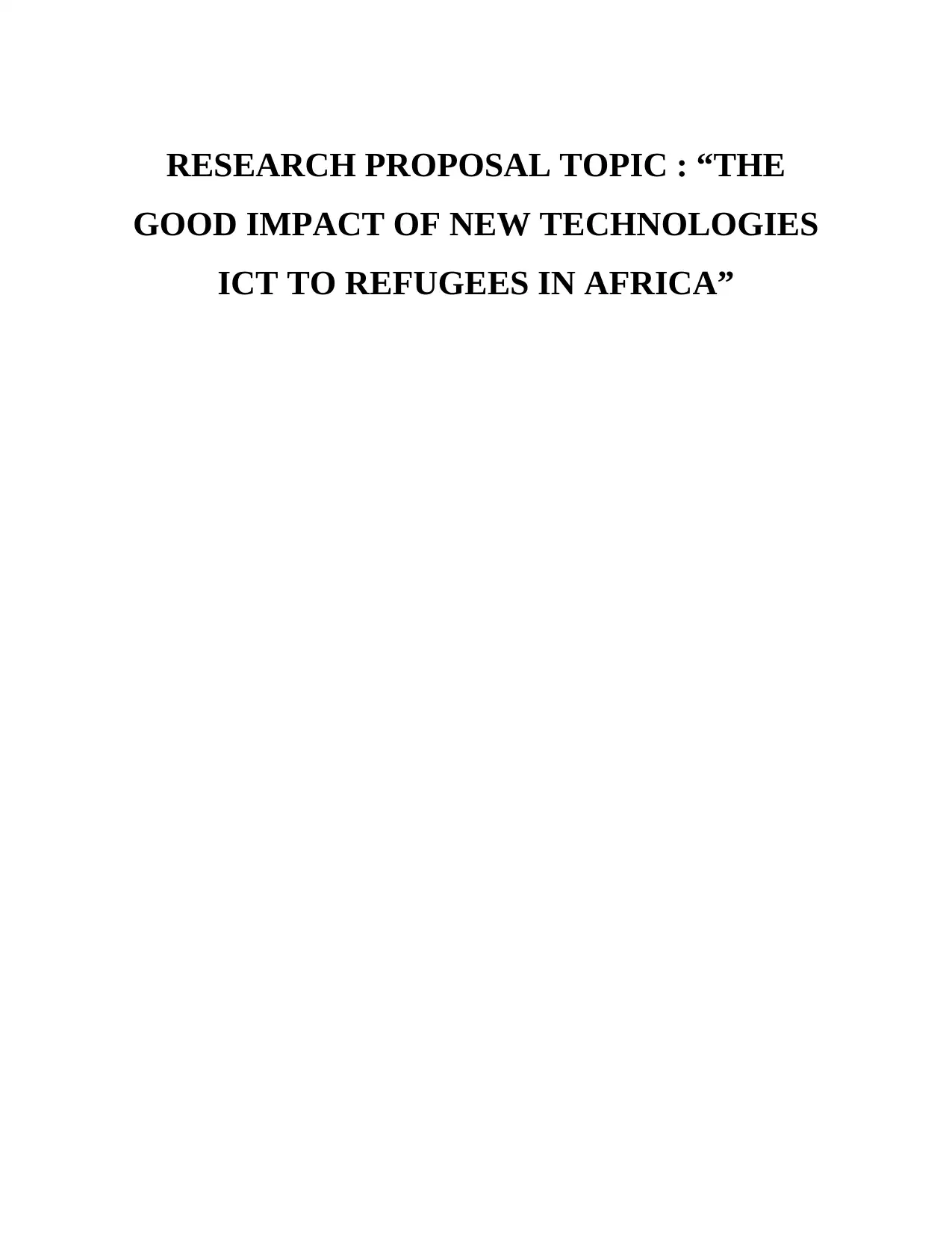
RESEARCH PROPOSAL TOPIC : “THE
GOOD IMPACT OF NEW TECHNOLOGIES
ICT TO REFUGEES IN AFRICA”
GOOD IMPACT OF NEW TECHNOLOGIES
ICT TO REFUGEES IN AFRICA”
Paraphrase This Document
Need a fresh take? Get an instant paraphrase of this document with our AI Paraphraser
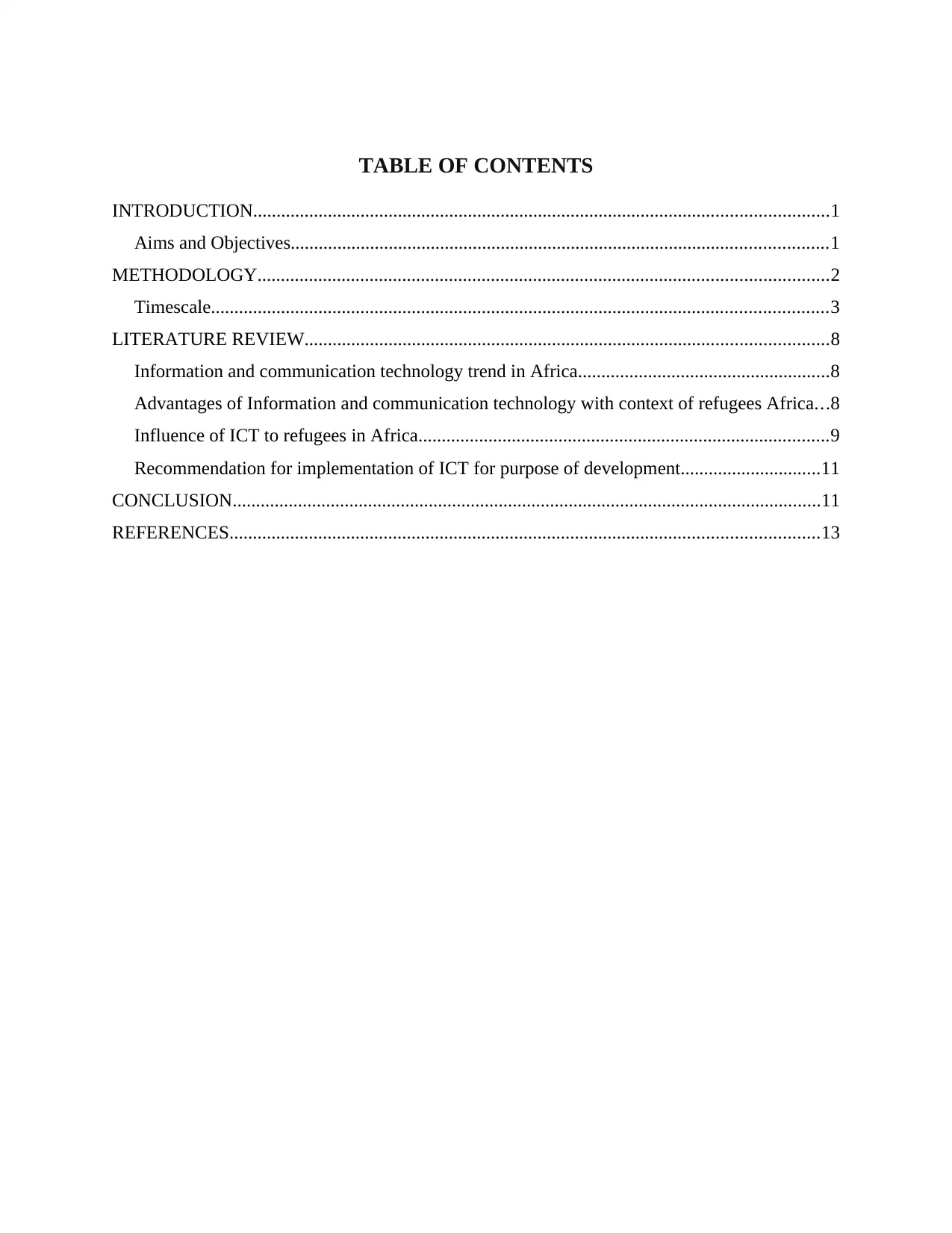
TABLE OF CONTENTS
INTRODUCTION...........................................................................................................................1
Aims and Objectives...................................................................................................................1
METHODOLOGY..........................................................................................................................2
Timescale....................................................................................................................................3
LITERATURE REVIEW................................................................................................................8
Information and communication technology trend in Africa......................................................8
Advantages of Information and communication technology with context of refugees Africa...8
Influence of ICT to refugees in Africa........................................................................................9
Recommendation for implementation of ICT for purpose of development..............................11
CONCLUSION..............................................................................................................................11
REFERENCES..............................................................................................................................13
INTRODUCTION...........................................................................................................................1
Aims and Objectives...................................................................................................................1
METHODOLOGY..........................................................................................................................2
Timescale....................................................................................................................................3
LITERATURE REVIEW................................................................................................................8
Information and communication technology trend in Africa......................................................8
Advantages of Information and communication technology with context of refugees Africa...8
Influence of ICT to refugees in Africa........................................................................................9
Recommendation for implementation of ICT for purpose of development..............................11
CONCLUSION..............................................................................................................................11
REFERENCES..............................................................................................................................13
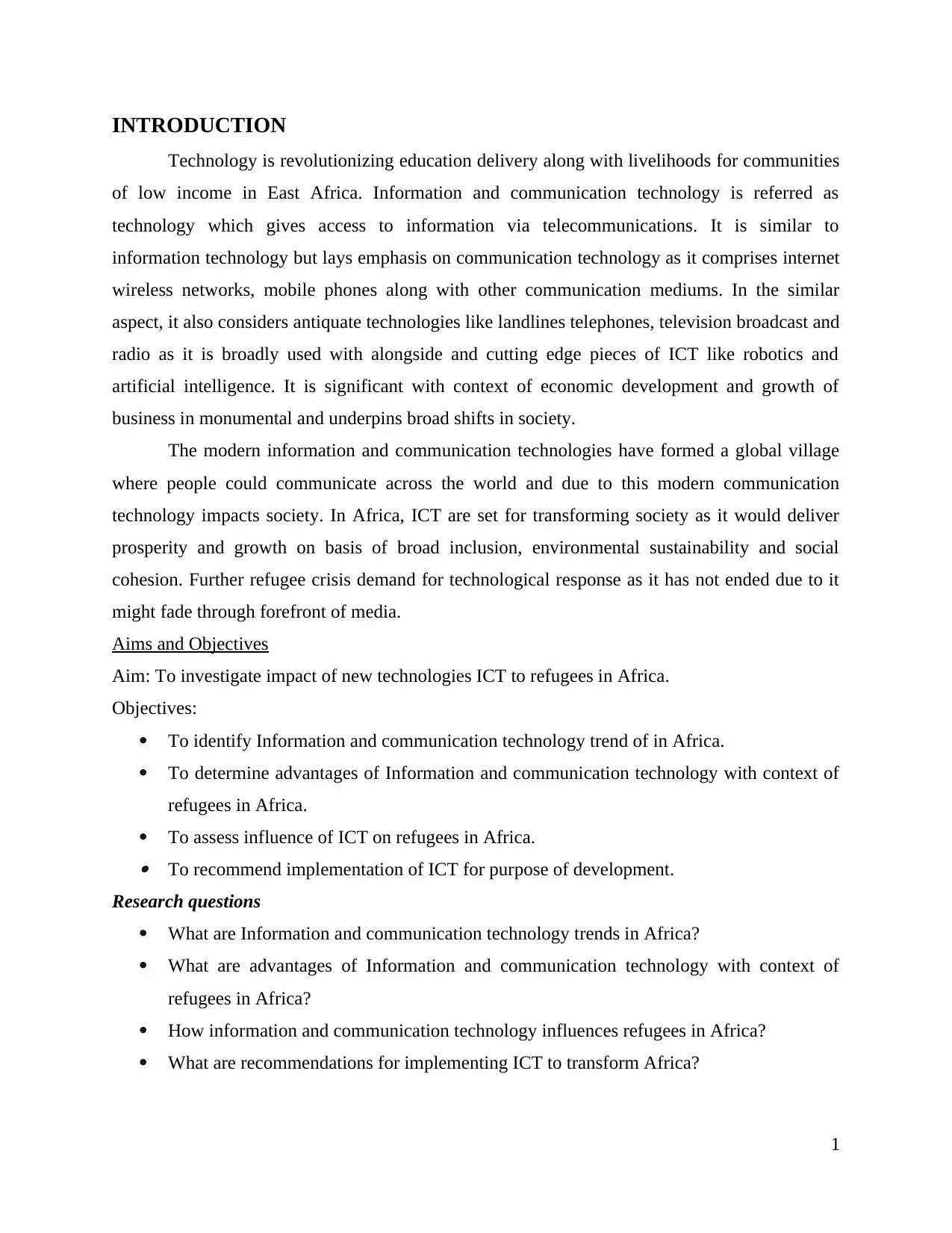
INTRODUCTION
Technology is revolutionizing education delivery along with livelihoods for communities
of low income in East Africa. Information and communication technology is referred as
technology which gives access to information via telecommunications. It is similar to
information technology but lays emphasis on communication technology as it comprises internet
wireless networks, mobile phones along with other communication mediums. In the similar
aspect, it also considers antiquate technologies like landlines telephones, television broadcast and
radio as it is broadly used with alongside and cutting edge pieces of ICT like robotics and
artificial intelligence. It is significant with context of economic development and growth of
business in monumental and underpins broad shifts in society.
The modern information and communication technologies have formed a global village
where people could communicate across the world and due to this modern communication
technology impacts society. In Africa, ICT are set for transforming society as it would deliver
prosperity and growth on basis of broad inclusion, environmental sustainability and social
cohesion. Further refugee crisis demand for technological response as it has not ended due to it
might fade through forefront of media.
Aims and Objectives
Aim: To investigate impact of new technologies ICT to refugees in Africa.
Objectives:
To identify Information and communication technology trend of in Africa.
To determine advantages of Information and communication technology with context of
refugees in Africa.
To assess influence of ICT on refugees in Africa. To recommend implementation of ICT for purpose of development.
Research questions
What are Information and communication technology trends in Africa?
What are advantages of Information and communication technology with context of
refugees in Africa?
How information and communication technology influences refugees in Africa?
What are recommendations for implementing ICT to transform Africa?
1
Technology is revolutionizing education delivery along with livelihoods for communities
of low income in East Africa. Information and communication technology is referred as
technology which gives access to information via telecommunications. It is similar to
information technology but lays emphasis on communication technology as it comprises internet
wireless networks, mobile phones along with other communication mediums. In the similar
aspect, it also considers antiquate technologies like landlines telephones, television broadcast and
radio as it is broadly used with alongside and cutting edge pieces of ICT like robotics and
artificial intelligence. It is significant with context of economic development and growth of
business in monumental and underpins broad shifts in society.
The modern information and communication technologies have formed a global village
where people could communicate across the world and due to this modern communication
technology impacts society. In Africa, ICT are set for transforming society as it would deliver
prosperity and growth on basis of broad inclusion, environmental sustainability and social
cohesion. Further refugee crisis demand for technological response as it has not ended due to it
might fade through forefront of media.
Aims and Objectives
Aim: To investigate impact of new technologies ICT to refugees in Africa.
Objectives:
To identify Information and communication technology trend of in Africa.
To determine advantages of Information and communication technology with context of
refugees in Africa.
To assess influence of ICT on refugees in Africa. To recommend implementation of ICT for purpose of development.
Research questions
What are Information and communication technology trends in Africa?
What are advantages of Information and communication technology with context of
refugees in Africa?
How information and communication technology influences refugees in Africa?
What are recommendations for implementing ICT to transform Africa?
1
⊘ This is a preview!⊘
Do you want full access?
Subscribe today to unlock all pages.

Trusted by 1+ million students worldwide
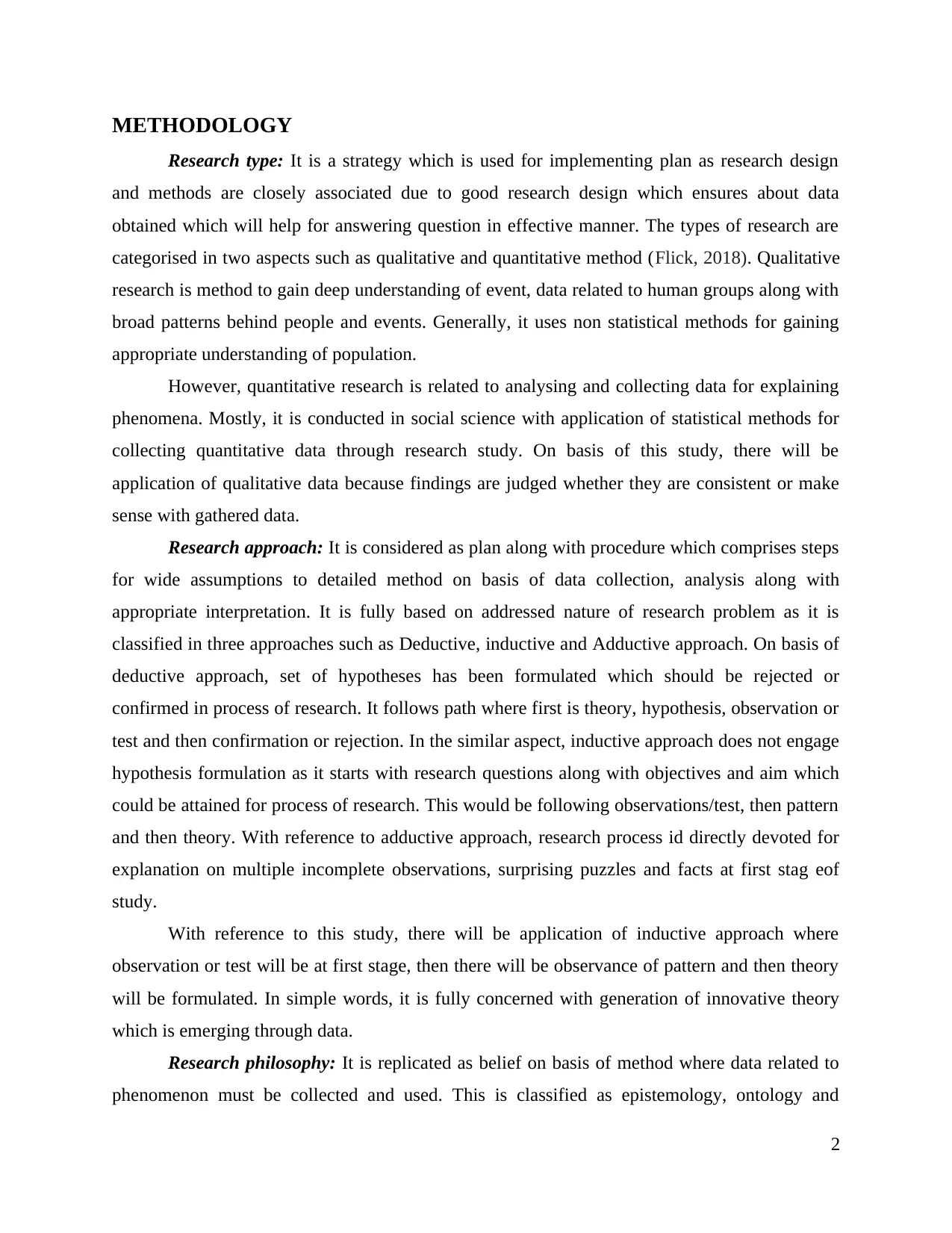
METHODOLOGY
Research type: It is a strategy which is used for implementing plan as research design
and methods are closely associated due to good research design which ensures about data
obtained which will help for answering question in effective manner. The types of research are
categorised in two aspects such as qualitative and quantitative method (Flick, 2018). Qualitative
research is method to gain deep understanding of event, data related to human groups along with
broad patterns behind people and events. Generally, it uses non statistical methods for gaining
appropriate understanding of population.
However, quantitative research is related to analysing and collecting data for explaining
phenomena. Mostly, it is conducted in social science with application of statistical methods for
collecting quantitative data through research study. On basis of this study, there will be
application of qualitative data because findings are judged whether they are consistent or make
sense with gathered data.
Research approach: It is considered as plan along with procedure which comprises steps
for wide assumptions to detailed method on basis of data collection, analysis along with
appropriate interpretation. It is fully based on addressed nature of research problem as it is
classified in three approaches such as Deductive, inductive and Adductive approach. On basis of
deductive approach, set of hypotheses has been formulated which should be rejected or
confirmed in process of research. It follows path where first is theory, hypothesis, observation or
test and then confirmation or rejection. In the similar aspect, inductive approach does not engage
hypothesis formulation as it starts with research questions along with objectives and aim which
could be attained for process of research. This would be following observations/test, then pattern
and then theory. With reference to adductive approach, research process id directly devoted for
explanation on multiple incomplete observations, surprising puzzles and facts at first stag eof
study.
With reference to this study, there will be application of inductive approach where
observation or test will be at first stage, then there will be observance of pattern and then theory
will be formulated. In simple words, it is fully concerned with generation of innovative theory
which is emerging through data.
Research philosophy: It is replicated as belief on basis of method where data related to
phenomenon must be collected and used. This is classified as epistemology, ontology and
2
Research type: It is a strategy which is used for implementing plan as research design
and methods are closely associated due to good research design which ensures about data
obtained which will help for answering question in effective manner. The types of research are
categorised in two aspects such as qualitative and quantitative method (Flick, 2018). Qualitative
research is method to gain deep understanding of event, data related to human groups along with
broad patterns behind people and events. Generally, it uses non statistical methods for gaining
appropriate understanding of population.
However, quantitative research is related to analysing and collecting data for explaining
phenomena. Mostly, it is conducted in social science with application of statistical methods for
collecting quantitative data through research study. On basis of this study, there will be
application of qualitative data because findings are judged whether they are consistent or make
sense with gathered data.
Research approach: It is considered as plan along with procedure which comprises steps
for wide assumptions to detailed method on basis of data collection, analysis along with
appropriate interpretation. It is fully based on addressed nature of research problem as it is
classified in three approaches such as Deductive, inductive and Adductive approach. On basis of
deductive approach, set of hypotheses has been formulated which should be rejected or
confirmed in process of research. It follows path where first is theory, hypothesis, observation or
test and then confirmation or rejection. In the similar aspect, inductive approach does not engage
hypothesis formulation as it starts with research questions along with objectives and aim which
could be attained for process of research. This would be following observations/test, then pattern
and then theory. With reference to adductive approach, research process id directly devoted for
explanation on multiple incomplete observations, surprising puzzles and facts at first stag eof
study.
With reference to this study, there will be application of inductive approach where
observation or test will be at first stage, then there will be observance of pattern and then theory
will be formulated. In simple words, it is fully concerned with generation of innovative theory
which is emerging through data.
Research philosophy: It is replicated as belief on basis of method where data related to
phenomenon must be collected and used. This is classified as epistemology, ontology and
2
Paraphrase This Document
Need a fresh take? Get an instant paraphrase of this document with our AI Paraphraser
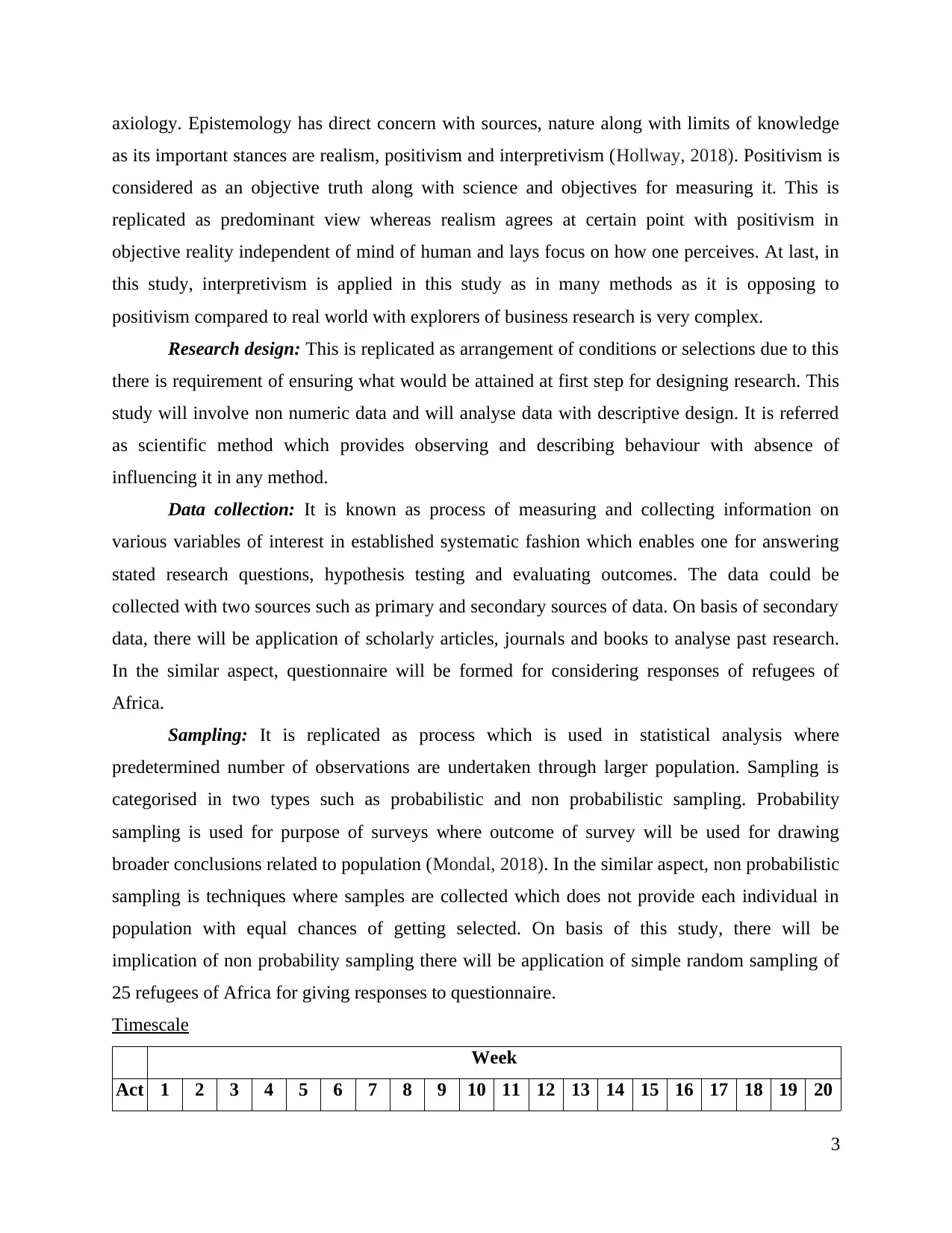
axiology. Epistemology has direct concern with sources, nature along with limits of knowledge
as its important stances are realism, positivism and interpretivism (Hollway, 2018). Positivism is
considered as an objective truth along with science and objectives for measuring it. This is
replicated as predominant view whereas realism agrees at certain point with positivism in
objective reality independent of mind of human and lays focus on how one perceives. At last, in
this study, interpretivism is applied in this study as in many methods as it is opposing to
positivism compared to real world with explorers of business research is very complex.
Research design: This is replicated as arrangement of conditions or selections due to this
there is requirement of ensuring what would be attained at first step for designing research. This
study will involve non numeric data and will analyse data with descriptive design. It is referred
as scientific method which provides observing and describing behaviour with absence of
influencing it in any method.
Data collection: It is known as process of measuring and collecting information on
various variables of interest in established systematic fashion which enables one for answering
stated research questions, hypothesis testing and evaluating outcomes. The data could be
collected with two sources such as primary and secondary sources of data. On basis of secondary
data, there will be application of scholarly articles, journals and books to analyse past research.
In the similar aspect, questionnaire will be formed for considering responses of refugees of
Africa.
Sampling: It is replicated as process which is used in statistical analysis where
predetermined number of observations are undertaken through larger population. Sampling is
categorised in two types such as probabilistic and non probabilistic sampling. Probability
sampling is used for purpose of surveys where outcome of survey will be used for drawing
broader conclusions related to population (Mondal, 2018). In the similar aspect, non probabilistic
sampling is techniques where samples are collected which does not provide each individual in
population with equal chances of getting selected. On basis of this study, there will be
implication of non probability sampling there will be application of simple random sampling of
25 refugees of Africa for giving responses to questionnaire.
Timescale
Week
Act 1 2 3 4 5 6 7 8 9 10 11 12 13 14 15 16 17 18 19 20
3
as its important stances are realism, positivism and interpretivism (Hollway, 2018). Positivism is
considered as an objective truth along with science and objectives for measuring it. This is
replicated as predominant view whereas realism agrees at certain point with positivism in
objective reality independent of mind of human and lays focus on how one perceives. At last, in
this study, interpretivism is applied in this study as in many methods as it is opposing to
positivism compared to real world with explorers of business research is very complex.
Research design: This is replicated as arrangement of conditions or selections due to this
there is requirement of ensuring what would be attained at first step for designing research. This
study will involve non numeric data and will analyse data with descriptive design. It is referred
as scientific method which provides observing and describing behaviour with absence of
influencing it in any method.
Data collection: It is known as process of measuring and collecting information on
various variables of interest in established systematic fashion which enables one for answering
stated research questions, hypothesis testing and evaluating outcomes. The data could be
collected with two sources such as primary and secondary sources of data. On basis of secondary
data, there will be application of scholarly articles, journals and books to analyse past research.
In the similar aspect, questionnaire will be formed for considering responses of refugees of
Africa.
Sampling: It is replicated as process which is used in statistical analysis where
predetermined number of observations are undertaken through larger population. Sampling is
categorised in two types such as probabilistic and non probabilistic sampling. Probability
sampling is used for purpose of surveys where outcome of survey will be used for drawing
broader conclusions related to population (Mondal, 2018). In the similar aspect, non probabilistic
sampling is techniques where samples are collected which does not provide each individual in
population with equal chances of getting selected. On basis of this study, there will be
implication of non probability sampling there will be application of simple random sampling of
25 refugees of Africa for giving responses to questionnaire.
Timescale
Week
Act 1 2 3 4 5 6 7 8 9 10 11 12 13 14 15 16 17 18 19 20
3
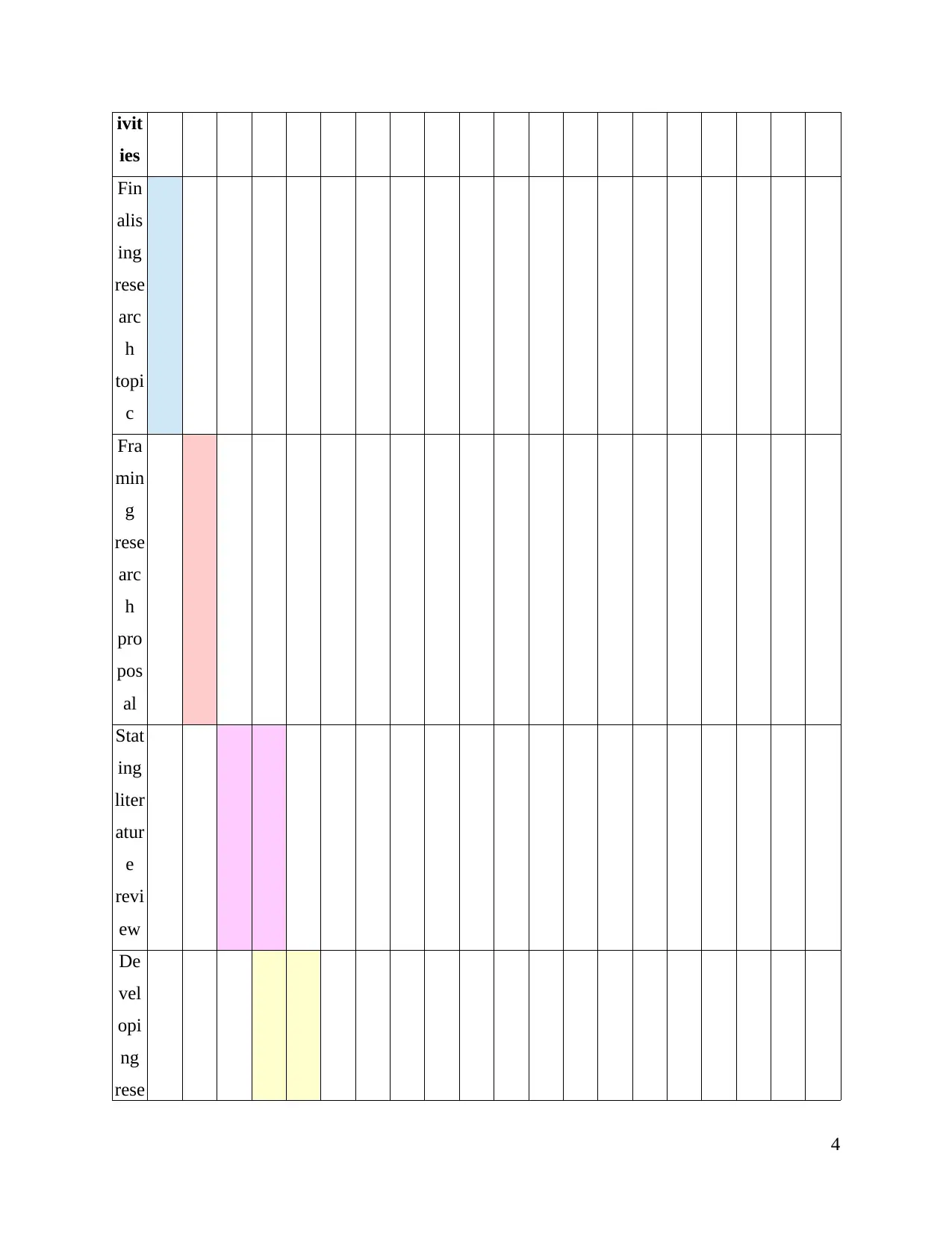
ivit
ies
Fin
alis
ing
rese
arc
h
topi
c
Fra
min
g
rese
arc
h
pro
pos
al
Stat
ing
liter
atur
e
revi
ew
De
vel
opi
ng
rese
4
ies
Fin
alis
ing
rese
arc
h
topi
c
Fra
min
g
rese
arc
h
pro
pos
al
Stat
ing
liter
atur
e
revi
ew
De
vel
opi
ng
rese
4
⊘ This is a preview!⊘
Do you want full access?
Subscribe today to unlock all pages.

Trusted by 1+ million students worldwide
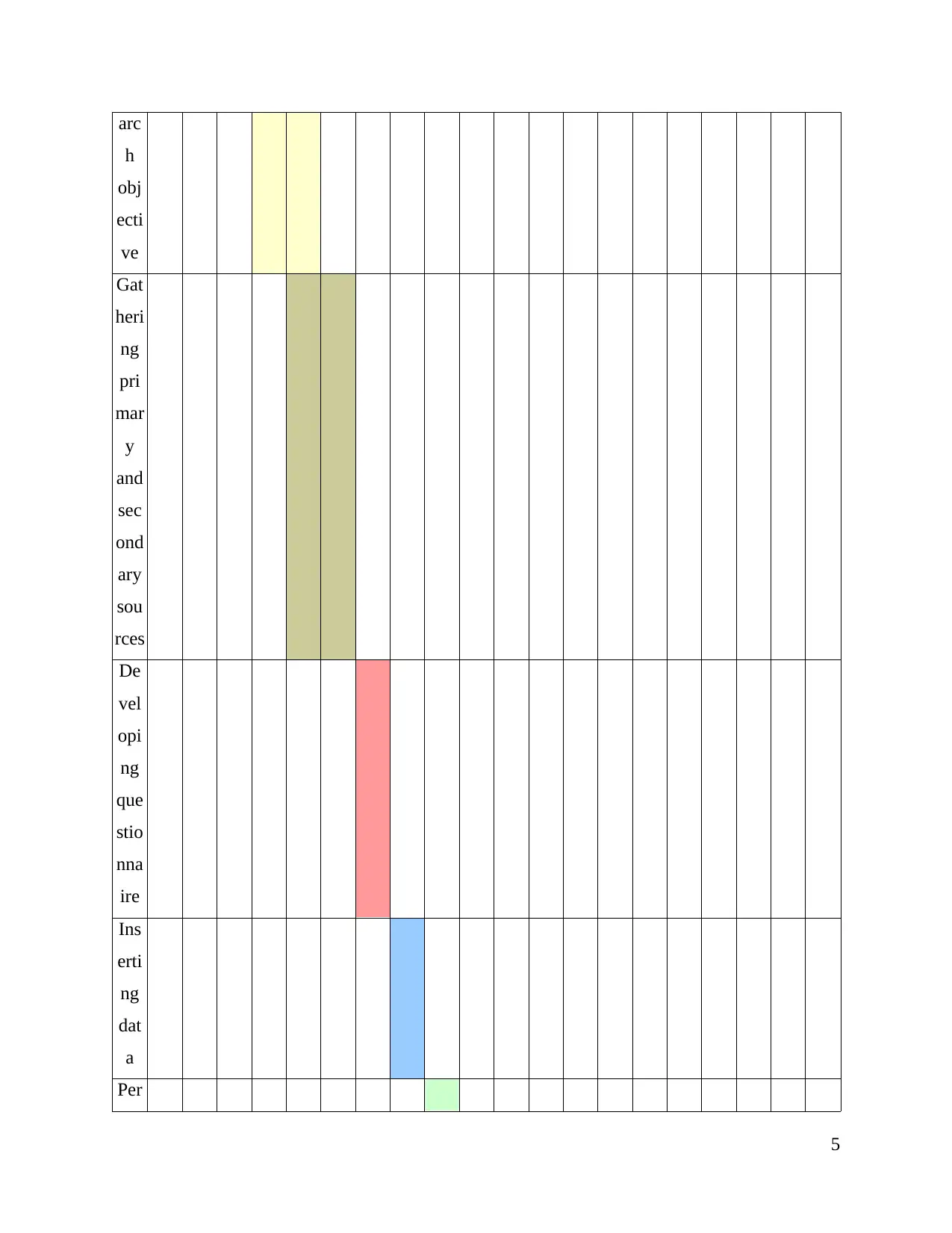
arc
h
obj
ecti
ve
Gat
heri
ng
pri
mar
y
and
sec
ond
ary
sou
rces
De
vel
opi
ng
que
stio
nna
ire
Ins
erti
ng
dat
a
Per
5
h
obj
ecti
ve
Gat
heri
ng
pri
mar
y
and
sec
ond
ary
sou
rces
De
vel
opi
ng
que
stio
nna
ire
Ins
erti
ng
dat
a
Per
5
Paraphrase This Document
Need a fresh take? Get an instant paraphrase of this document with our AI Paraphraser
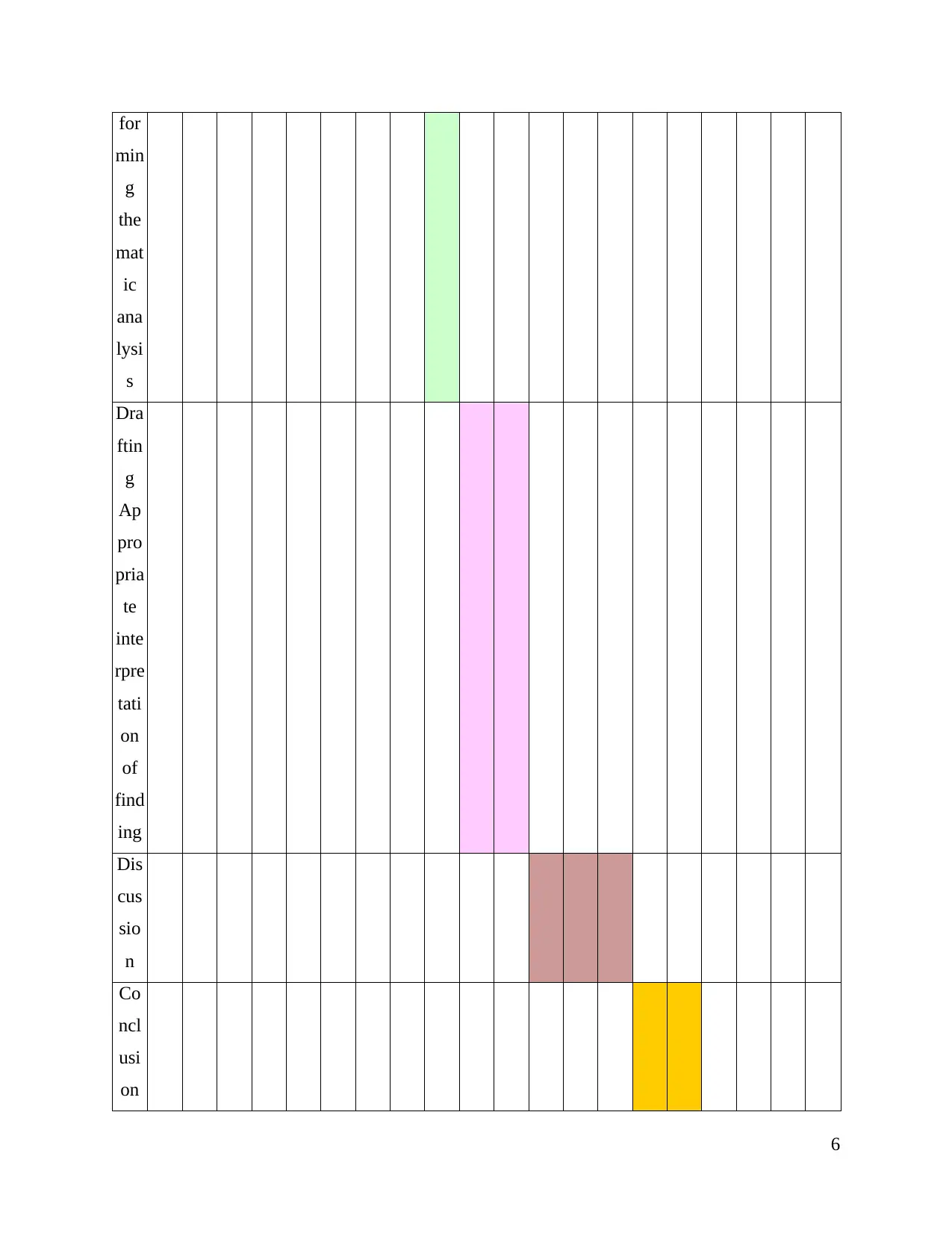
for
min
g
the
mat
ic
ana
lysi
s
Dra
ftin
g
Ap
pro
pria
te
inte
rpre
tati
on
of
find
ing
Dis
cus
sio
n
Co
ncl
usi
on
6
min
g
the
mat
ic
ana
lysi
s
Dra
ftin
g
Ap
pro
pria
te
inte
rpre
tati
on
of
find
ing
Dis
cus
sio
n
Co
ncl
usi
on
6
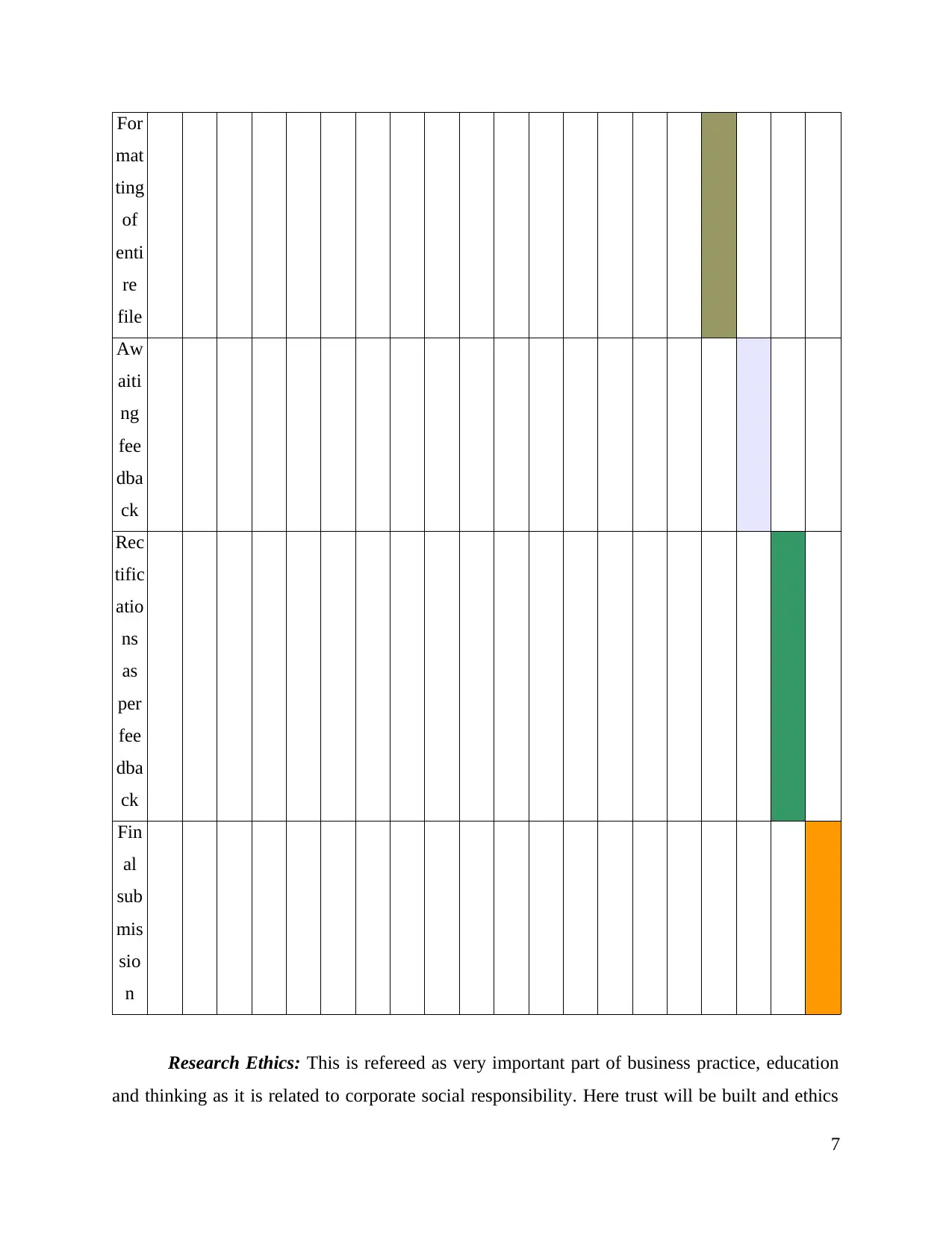
For
mat
ting
of
enti
re
file
Aw
aiti
ng
fee
dba
ck
Rec
tific
atio
ns
as
per
fee
dba
ck
Fin
al
sub
mis
sio
n
Research Ethics: This is refereed as very important part of business practice, education
and thinking as it is related to corporate social responsibility. Here trust will be built and ethics
7
mat
ting
of
enti
re
file
Aw
aiti
ng
fee
dba
ck
Rec
tific
atio
ns
as
per
fee
dba
ck
Fin
al
sub
mis
sio
n
Research Ethics: This is refereed as very important part of business practice, education
and thinking as it is related to corporate social responsibility. Here trust will be built and ethics
7
⊘ This is a preview!⊘
Do you want full access?
Subscribe today to unlock all pages.

Trusted by 1+ million students worldwide
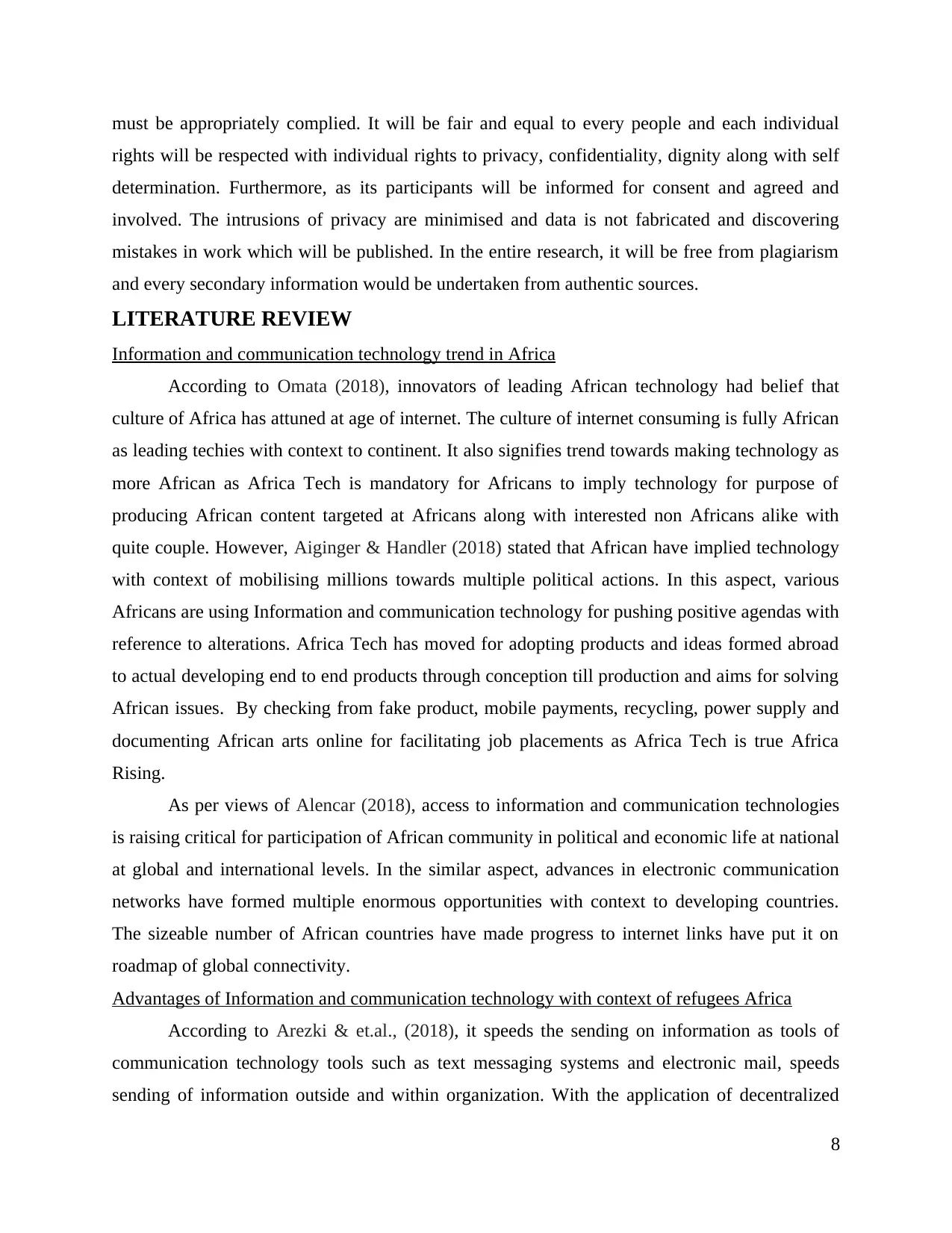
must be appropriately complied. It will be fair and equal to every people and each individual
rights will be respected with individual rights to privacy, confidentiality, dignity along with self
determination. Furthermore, as its participants will be informed for consent and agreed and
involved. The intrusions of privacy are minimised and data is not fabricated and discovering
mistakes in work which will be published. In the entire research, it will be free from plagiarism
and every secondary information would be undertaken from authentic sources.
LITERATURE REVIEW
Information and communication technology trend in Africa
According to Omata (2018), innovators of leading African technology had belief that
culture of Africa has attuned at age of internet. The culture of internet consuming is fully African
as leading techies with context to continent. It also signifies trend towards making technology as
more African as Africa Tech is mandatory for Africans to imply technology for purpose of
producing African content targeted at Africans along with interested non Africans alike with
quite couple. However, Aiginger & Handler (2018) stated that African have implied technology
with context of mobilising millions towards multiple political actions. In this aspect, various
Africans are using Information and communication technology for pushing positive agendas with
reference to alterations. Africa Tech has moved for adopting products and ideas formed abroad
to actual developing end to end products through conception till production and aims for solving
African issues. By checking from fake product, mobile payments, recycling, power supply and
documenting African arts online for facilitating job placements as Africa Tech is true Africa
Rising.
As per views of Alencar (2018), access to information and communication technologies
is raising critical for participation of African community in political and economic life at national
at global and international levels. In the similar aspect, advances in electronic communication
networks have formed multiple enormous opportunities with context to developing countries.
The sizeable number of African countries have made progress to internet links have put it on
roadmap of global connectivity.
Advantages of Information and communication technology with context of refugees Africa
According to Arezki & et.al., (2018), it speeds the sending on information as tools of
communication technology tools such as text messaging systems and electronic mail, speeds
sending of information outside and within organization. With the application of decentralized
8
rights will be respected with individual rights to privacy, confidentiality, dignity along with self
determination. Furthermore, as its participants will be informed for consent and agreed and
involved. The intrusions of privacy are minimised and data is not fabricated and discovering
mistakes in work which will be published. In the entire research, it will be free from plagiarism
and every secondary information would be undertaken from authentic sources.
LITERATURE REVIEW
Information and communication technology trend in Africa
According to Omata (2018), innovators of leading African technology had belief that
culture of Africa has attuned at age of internet. The culture of internet consuming is fully African
as leading techies with context to continent. It also signifies trend towards making technology as
more African as Africa Tech is mandatory for Africans to imply technology for purpose of
producing African content targeted at Africans along with interested non Africans alike with
quite couple. However, Aiginger & Handler (2018) stated that African have implied technology
with context of mobilising millions towards multiple political actions. In this aspect, various
Africans are using Information and communication technology for pushing positive agendas with
reference to alterations. Africa Tech has moved for adopting products and ideas formed abroad
to actual developing end to end products through conception till production and aims for solving
African issues. By checking from fake product, mobile payments, recycling, power supply and
documenting African arts online for facilitating job placements as Africa Tech is true Africa
Rising.
As per views of Alencar (2018), access to information and communication technologies
is raising critical for participation of African community in political and economic life at national
at global and international levels. In the similar aspect, advances in electronic communication
networks have formed multiple enormous opportunities with context to developing countries.
The sizeable number of African countries have made progress to internet links have put it on
roadmap of global connectivity.
Advantages of Information and communication technology with context of refugees Africa
According to Arezki & et.al., (2018), it speeds the sending on information as tools of
communication technology tools such as text messaging systems and electronic mail, speeds
sending of information outside and within organization. With the application of decentralized
8
Paraphrase This Document
Need a fresh take? Get an instant paraphrase of this document with our AI Paraphraser
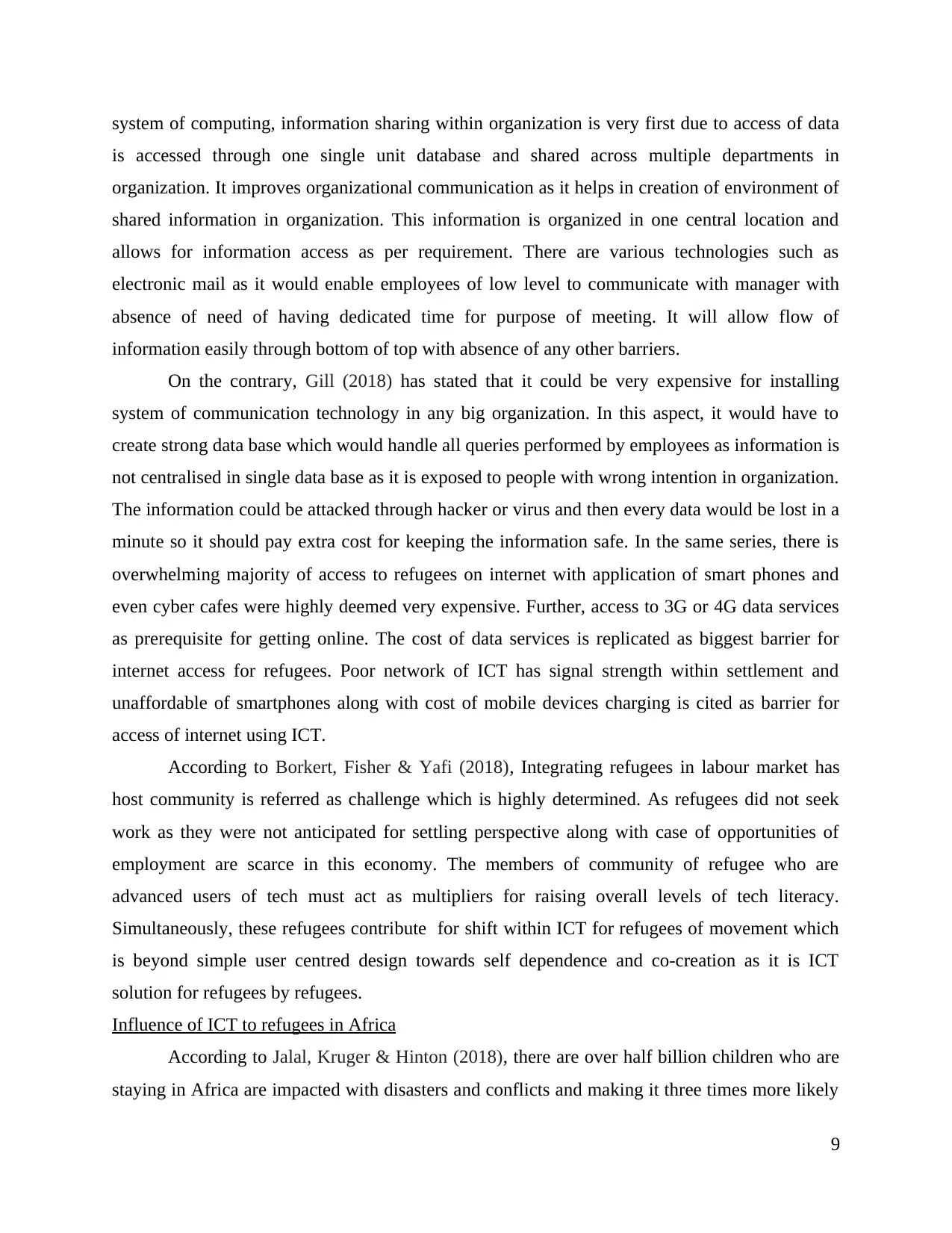
system of computing, information sharing within organization is very first due to access of data
is accessed through one single unit database and shared across multiple departments in
organization. It improves organizational communication as it helps in creation of environment of
shared information in organization. This information is organized in one central location and
allows for information access as per requirement. There are various technologies such as
electronic mail as it would enable employees of low level to communicate with manager with
absence of need of having dedicated time for purpose of meeting. It will allow flow of
information easily through bottom of top with absence of any other barriers.
On the contrary, Gill (2018) has stated that it could be very expensive for installing
system of communication technology in any big organization. In this aspect, it would have to
create strong data base which would handle all queries performed by employees as information is
not centralised in single data base as it is exposed to people with wrong intention in organization.
The information could be attacked through hacker or virus and then every data would be lost in a
minute so it should pay extra cost for keeping the information safe. In the same series, there is
overwhelming majority of access to refugees on internet with application of smart phones and
even cyber cafes were highly deemed very expensive. Further, access to 3G or 4G data services
as prerequisite for getting online. The cost of data services is replicated as biggest barrier for
internet access for refugees. Poor network of ICT has signal strength within settlement and
unaffordable of smartphones along with cost of mobile devices charging is cited as barrier for
access of internet using ICT.
According to Borkert, Fisher & Yafi (2018), Integrating refugees in labour market has
host community is referred as challenge which is highly determined. As refugees did not seek
work as they were not anticipated for settling perspective along with case of opportunities of
employment are scarce in this economy. The members of community of refugee who are
advanced users of tech must act as multipliers for raising overall levels of tech literacy.
Simultaneously, these refugees contribute for shift within ICT for refugees of movement which
is beyond simple user centred design towards self dependence and co-creation as it is ICT
solution for refugees by refugees.
Influence of ICT to refugees in Africa
According to Jalal, Kruger & Hinton (2018), there are over half billion children who are
staying in Africa are impacted with disasters and conflicts and making it three times more likely
9
is accessed through one single unit database and shared across multiple departments in
organization. It improves organizational communication as it helps in creation of environment of
shared information in organization. This information is organized in one central location and
allows for information access as per requirement. There are various technologies such as
electronic mail as it would enable employees of low level to communicate with manager with
absence of need of having dedicated time for purpose of meeting. It will allow flow of
information easily through bottom of top with absence of any other barriers.
On the contrary, Gill (2018) has stated that it could be very expensive for installing
system of communication technology in any big organization. In this aspect, it would have to
create strong data base which would handle all queries performed by employees as information is
not centralised in single data base as it is exposed to people with wrong intention in organization.
The information could be attacked through hacker or virus and then every data would be lost in a
minute so it should pay extra cost for keeping the information safe. In the same series, there is
overwhelming majority of access to refugees on internet with application of smart phones and
even cyber cafes were highly deemed very expensive. Further, access to 3G or 4G data services
as prerequisite for getting online. The cost of data services is replicated as biggest barrier for
internet access for refugees. Poor network of ICT has signal strength within settlement and
unaffordable of smartphones along with cost of mobile devices charging is cited as barrier for
access of internet using ICT.
According to Borkert, Fisher & Yafi (2018), Integrating refugees in labour market has
host community is referred as challenge which is highly determined. As refugees did not seek
work as they were not anticipated for settling perspective along with case of opportunities of
employment are scarce in this economy. The members of community of refugee who are
advanced users of tech must act as multipliers for raising overall levels of tech literacy.
Simultaneously, these refugees contribute for shift within ICT for refugees of movement which
is beyond simple user centred design towards self dependence and co-creation as it is ICT
solution for refugees by refugees.
Influence of ICT to refugees in Africa
According to Jalal, Kruger & Hinton (2018), there are over half billion children who are
staying in Africa are impacted with disasters and conflicts and making it three times more likely
9
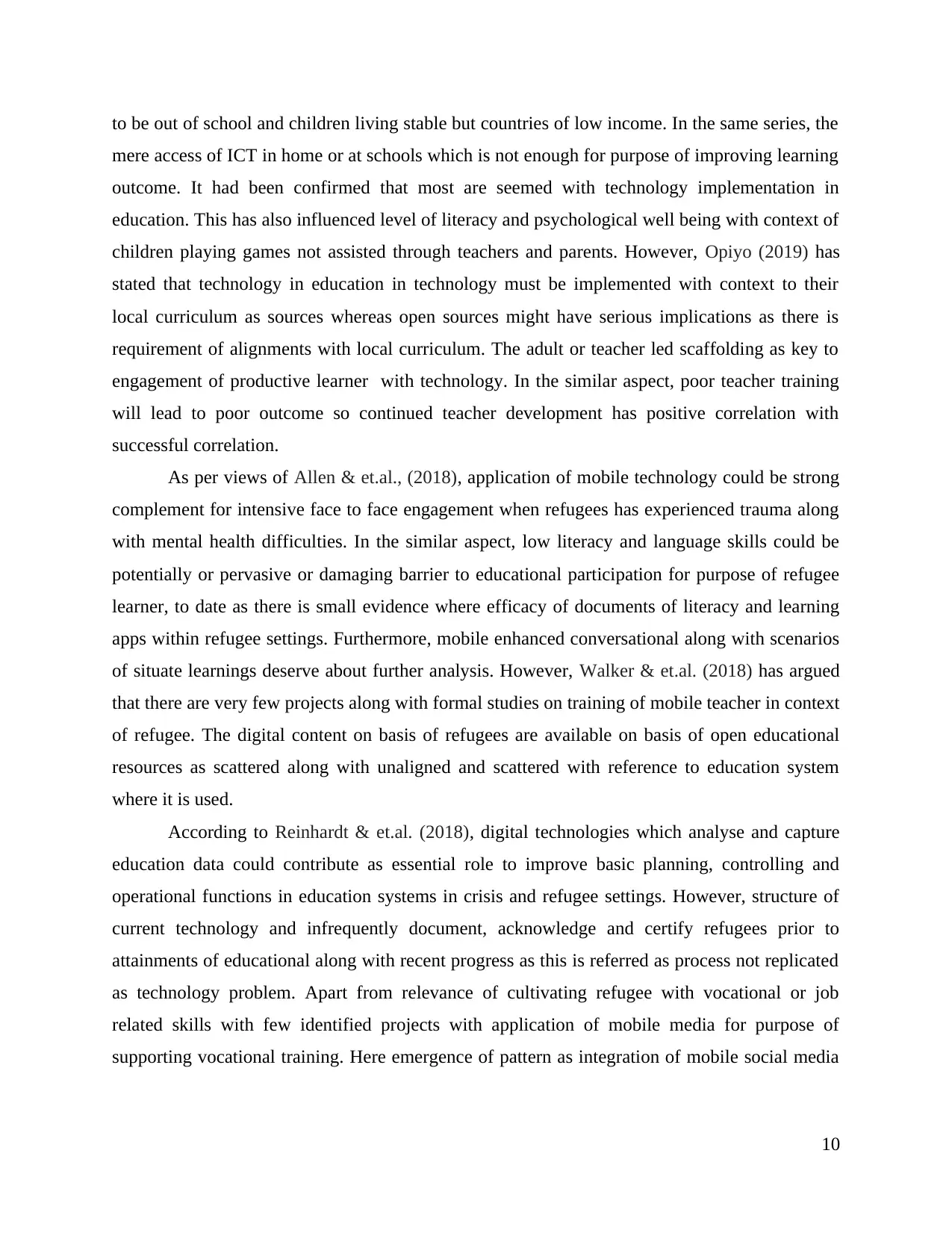
to be out of school and children living stable but countries of low income. In the same series, the
mere access of ICT in home or at schools which is not enough for purpose of improving learning
outcome. It had been confirmed that most are seemed with technology implementation in
education. This has also influenced level of literacy and psychological well being with context of
children playing games not assisted through teachers and parents. However, Opiyo (2019) has
stated that technology in education in technology must be implemented with context to their
local curriculum as sources whereas open sources might have serious implications as there is
requirement of alignments with local curriculum. The adult or teacher led scaffolding as key to
engagement of productive learner with technology. In the similar aspect, poor teacher training
will lead to poor outcome so continued teacher development has positive correlation with
successful correlation.
As per views of Allen & et.al., (2018), application of mobile technology could be strong
complement for intensive face to face engagement when refugees has experienced trauma along
with mental health difficulties. In the similar aspect, low literacy and language skills could be
potentially or pervasive or damaging barrier to educational participation for purpose of refugee
learner, to date as there is small evidence where efficacy of documents of literacy and learning
apps within refugee settings. Furthermore, mobile enhanced conversational along with scenarios
of situate learnings deserve about further analysis. However, Walker & et.al. (2018) has argued
that there are very few projects along with formal studies on training of mobile teacher in context
of refugee. The digital content on basis of refugees are available on basis of open educational
resources as scattered along with unaligned and scattered with reference to education system
where it is used.
According to Reinhardt & et.al. (2018), digital technologies which analyse and capture
education data could contribute as essential role to improve basic planning, controlling and
operational functions in education systems in crisis and refugee settings. However, structure of
current technology and infrequently document, acknowledge and certify refugees prior to
attainments of educational along with recent progress as this is referred as process not replicated
as technology problem. Apart from relevance of cultivating refugee with vocational or job
related skills with few identified projects with application of mobile media for purpose of
supporting vocational training. Here emergence of pattern as integration of mobile social media
10
mere access of ICT in home or at schools which is not enough for purpose of improving learning
outcome. It had been confirmed that most are seemed with technology implementation in
education. This has also influenced level of literacy and psychological well being with context of
children playing games not assisted through teachers and parents. However, Opiyo (2019) has
stated that technology in education in technology must be implemented with context to their
local curriculum as sources whereas open sources might have serious implications as there is
requirement of alignments with local curriculum. The adult or teacher led scaffolding as key to
engagement of productive learner with technology. In the similar aspect, poor teacher training
will lead to poor outcome so continued teacher development has positive correlation with
successful correlation.
As per views of Allen & et.al., (2018), application of mobile technology could be strong
complement for intensive face to face engagement when refugees has experienced trauma along
with mental health difficulties. In the similar aspect, low literacy and language skills could be
potentially or pervasive or damaging barrier to educational participation for purpose of refugee
learner, to date as there is small evidence where efficacy of documents of literacy and learning
apps within refugee settings. Furthermore, mobile enhanced conversational along with scenarios
of situate learnings deserve about further analysis. However, Walker & et.al. (2018) has argued
that there are very few projects along with formal studies on training of mobile teacher in context
of refugee. The digital content on basis of refugees are available on basis of open educational
resources as scattered along with unaligned and scattered with reference to education system
where it is used.
According to Reinhardt & et.al. (2018), digital technologies which analyse and capture
education data could contribute as essential role to improve basic planning, controlling and
operational functions in education systems in crisis and refugee settings. However, structure of
current technology and infrequently document, acknowledge and certify refugees prior to
attainments of educational along with recent progress as this is referred as process not replicated
as technology problem. Apart from relevance of cultivating refugee with vocational or job
related skills with few identified projects with application of mobile media for purpose of
supporting vocational training. Here emergence of pattern as integration of mobile social media
10
⊘ This is a preview!⊘
Do you want full access?
Subscribe today to unlock all pages.

Trusted by 1+ million students worldwide
1 out of 15
Related Documents
Your All-in-One AI-Powered Toolkit for Academic Success.
+13062052269
info@desklib.com
Available 24*7 on WhatsApp / Email
![[object Object]](/_next/static/media/star-bottom.7253800d.svg)
Unlock your academic potential
Copyright © 2020–2026 A2Z Services. All Rights Reserved. Developed and managed by ZUCOL.




